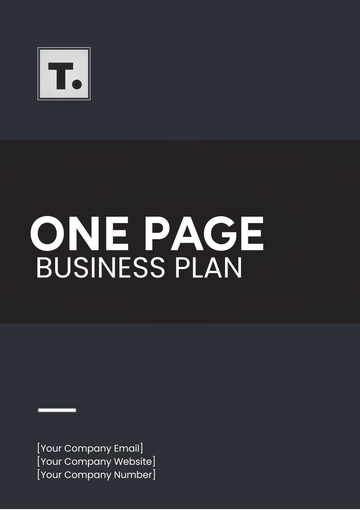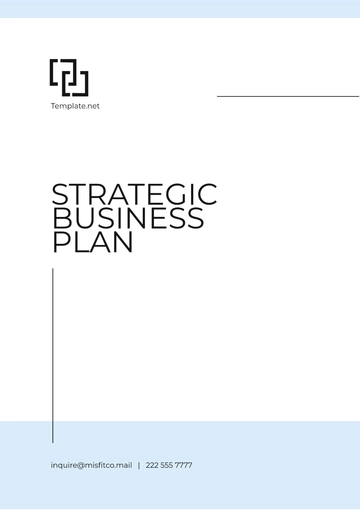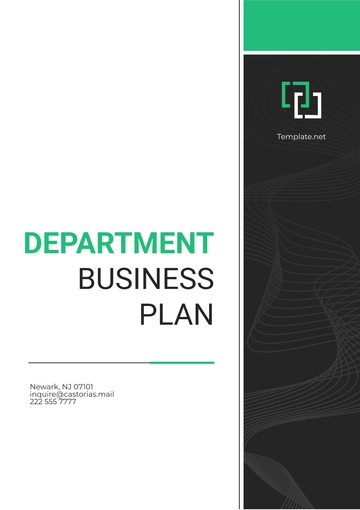Free Business 30 60 90 Day Plan

Written by: [Your Name]
I. Introduction
The introduction provides a comprehensive overview of the objectives and purpose of the 30 60 90 day plan. It outlines the importance of the plan in aligning organizational goals with individual actions, fostering clarity and focus, and driving results within the specified timeframe.
II. Goals and Objectives
In this section, the overarching goals and specific objectives for the first 30, 60, and 90 days are outlined in detail. These goals should be SMART (Specific, Measurable, Achievable, Relevant, Time-bound) to ensure clarity and effectiveness. The objectives should be aligned with the company's strategic priorities and reflect the individual's role and responsibilities within the organization. Additionally, key performance indicators (KPIs) or metrics for measuring progress towards these goals should be clearly defined to track success and provide accountability.
III. 30-Day Plan
Task | Description | Metrics/Measurable Outcome |
|---|---|---|
Conduct [Industry/Market] Research | Research [specific aspect] to understand market trends | Analyze [X] reports |
Develop [Specific Task/Project] Plan | Create a detailed plan outlining tasks and timelines | Complete plan document |
Meet with [Key Stakeholders] | Schedule meetings to introduce oneself and understand roles | Meet with [X] stakeholders |
IV. 60-Day Plan
Task | Description | Metrics/Measurable Outcome |
|---|---|---|
Execute [Specific Task/Project] Plan | Implement tasks as per the plan developed | Achieve [X]% completion |
Identify [Opportunities/Challenges] | Analyze current performance and identify areas for growth | Present findings to team |
Implement [Improvement Strategy] | Initiate improvements based on identified opportunities | Implement [X] strategies |
V. 90-Day Plan
Task | Description | Metrics/Measurable Outcome |
|---|---|---|
Evaluate Progress | Review progress against goals set for the first 90 days | Achieve [X] objectives |
Refine Strategies | Adjust strategies based on evaluation and feedback | Revise plan if necessary |
Present [90-Day Report] | Summarize achievements, challenges, and future plans | Deliver report to [X] |
VI. Additional Tasks
Additional tasks are those that may arise based on evolving needs or opportunities within the organization. These tasks supplement the core objectives outlined in the 30 60 90 day plan and contribute to overall success.
[Task 1]
Description: Specify the nature and purpose of the task. Outline any relevant details or context.
Metrics/Measurable Outcome: Define specific metrics or criteria for evaluating the success of the task. This could include quantitative targets or qualitative assessments.
[Task 2]
Description: Provide a clear description of the second additional task, including its significance and expected outcomes.
Metrics/Measurable Outcome: Establish measurable outcomes or performance indicators to assess the achievement of this task.
VII. Skill Development
Skill development is essential for personal and professional growth. This section focuses on identifying areas for improvement, acquiring new skills, and tracking progress through structured assessments.
Identify areas for skill enhancement: Conduct a self-assessment or seek feedback to identify areas where skills can be enhanced or developed further.
Enroll in relevant training programs: Research and enroll in training programs or courses that address identified skill gaps and align with career objectives.
Track progress through assessments: Regularly assess skill development progress through tests, quizzes, or practical exercises. Use feedback to refine learning strategies and prioritize areas for improvement.
VIII. Resource Allocation
Efficient resource allocation is crucial for achieving objectives within the specified timeframe. This section emphasizes the importance of allocating resources effectively and monitoring their utilization to maximize productivity and minimize waste.
Allocate resources efficiently to meet objectives: Identify and allocate resources such as budget, personnel, and technology to support the implementation of tasks and achieve desired outcomes.
Monitor resource utilization: Track resource utilization regularly to ensure alignment with project timelines and budgets. Adjust allocation as needed to address emerging priorities or constraints.
IX. Team Collaboration
Effective team collaboration fosters synergy and enhances productivity. This section highlights strategies for promoting collaboration, communication, and cohesion within the team.
Foster collaboration among team members: Encourage teamwork, mutual support, and knowledge sharing to leverage diverse perspectives and skills within the team.
Schedule regular team meetings: Establish a regular cadence for team meetings to discuss progress, address challenges, and align on priorities and goals.
Encourage open communication channels: Create an environment where team members feel comfortable expressing ideas, concerns, and feedback. Foster transparent communication through both formal and informal channels.
X. Conclusion
In conclusion, this section provides a summary of achievements and outlines future steps moving forward. Reflect on progress made during the 30 60 90 day period, highlight key accomplishments, and articulate plans for continued success in the role.
- 100% Customizable, free editor
- Access 1 Million+ Templates, photo’s & graphics
- Download or share as a template
- Click and replace photos, graphics, text, backgrounds
- Resize, crop, AI write & more
- Access advanced editor
You may also like
- One Page Business Plan
- Coffee Shop Business Plan
- Restaurant Business Plan
- Food Business Plan
- Real Estate Business Plan
- Executive Summary Business Plan
- Cover Page Business Plan
- Nonprofit Business Plan
- Daycare Business Plan
- Construction Business Plan
- Startup Business Plan
- Medical Business Plan
- Bakery Business Plan
- Service Plan
- Hotel Business Plan
- Catering Business Plan
- School Business Plan
- Healthcare Business Plan
- Transportation Plan
- Sports Plan
- Car Wash Business Plan
- Salon Business Plan
- Clothing Business Plan
- Farming Business Plan
- Boutique Plan





























